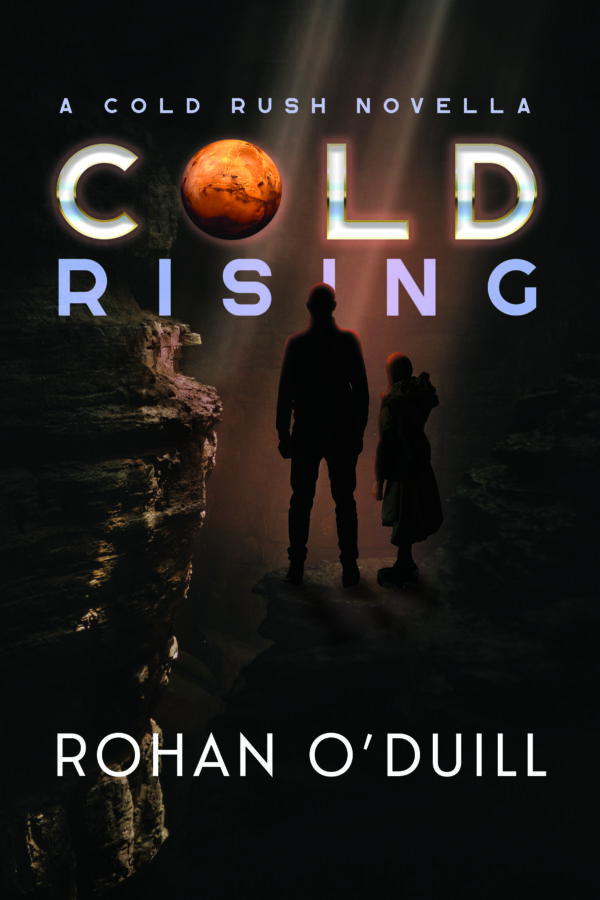A Cold Rush Novella
by
After a job gone wrong, Special Agent Olgo is trapped within the bowels of Mars with no means of escape. The device that imprisons the trauma within them is about to fail, and the past terrors kept hidden by it must be contained for Olgo’s sanity and everyone's safety.
From the darkness comes a tiny voice, and a tinier hope: "Hello?"
***
The first book in the ‘Cold Rush' Verse follows Agent Olgo as their corporate masters give them what could be their big break: a mission to Mars.
But trying to change the working conditions in the planet's underground cities proves more challenging than the agent could have imagined. When a wearable device Olgo uses to block emotions begins to fail, an unlikely friendship changes everything as Olgo struggles to prevent spilling more blood on the Red Planet.
Illustrators:
Cover Artists:
Genres:
Tropes: Body Modifications, Dystopian Governments, Evil Megacorporation, Found Family, Redemption Arc, Reluctant Hero, Secret Society
Word Count: 32000
Setting: Mars
Languages Available: English
Series Type: Same Universe / Various Characters
Tropes: Body Modifications, Dystopian Governments, Evil Megacorporation, Found Family, Redemption Arc, Reluctant Hero, Secret Society
Word Count: 32000
Setting: Mars
Languages Available: English
Series Type: Same Universe / Various Characters
Olgo’s two operatives were in play. After countless shitty
jobs, dozens of dead bodies and who knows how many
servers full of paperwork, Olgo was on a case that could
make their career.
Olgo strolled in the shadow of a massive tower block.
They patted the black and brown dust from their suit’s
shoulders. The dust covered everything down on the street.
The detritus from the city scrapers far above floated down to
the ancient potholed tarmac. Cars used to drive here before
personal drones became the preferred mode of transport.
Now it was the city’s discarded things that gathered here.
Olgo could never get used to the smell on the streets. The
sewage treatment plants were always at breaking point.
Large waste pipes snaked their way through the city, and
despite their undamaged appearance they emitted a strange
sickly smell, not exactly a shit smell, but something almost
worse.
A few people were about, but everyone kept their
business to themselves. Masks were standard in the open air.
Pollution levels wouldn't kill you, but they weren’t good for
you either. Olgo watched as the two operatives emerged
from the gloom, travelling on foot from Rue de Prince.
Olgo’s assistants were nearly comical in their appearance.
Glebe walked like a robot, arms always stretched out as if to
embrace someone. At nearly two metres in height, they were
tall for an Earther, and after all the body enhancements and
steroids, Glebe weighed about 250 kilograms. To have an
operative like Glebe was a statement, and despite their lack
of social skills, Glebe was loyal to a fault.
Stevie couldn’t be any more different. He strutted up the
street like he owned it. Stevie had been brought up rough in
a street orphanage—most likely he was a second child,
contravening the one-child policy, and abandoned at birth.
He had come up hard and bounced around every seedy
corner of Geneva. Stevie knew everything there was to know
about the underbelly of the city. It seemed impossible to
know every lowlife in a metropolis of two hundred million
people, but somehow, the operative managed it.
Their first run-in with Stevie was back when Olgo had
been an officer in the Geneva police. Stevie had broken into a
modder’s shop and was making off with thousands of
credits worth of implants when he literally tripped up over
Olgo while running out the shop door. The prisoner had
turned informant to get off the hook, giving away a few
locations for Olgo to raid. Stevie’s information proved so
valuable it fast-tracked Olgo’s police career. Five years later,
when Olgo had secured the job as a Micron agent and
received a budget for two personal operatives, they knew
exactly where to go for their first pick. Stevie brought Glebe
on board as muscle for Olgo’s crew, yet Olgo knew Stevie
was by far the more dangerous of the two. But in this line of
work, dangerous people were the most valuable to have on
your side.
The two operatives approached the shithole pub across
the street from where Olgo was lurking. The bouncer on the
door lost his arrogant demeanour when Stevie grinned up at
him through his scruffy goatee. Stevie had plenty of money
to mod his face to something pretty and laser his facial hair.
But he’d kept the ugly he had been born with. Olgo secretly
admired him for that.
Olgo’s own aesthetics were never foremost on their mind.
They had their hair lasered to avoid the hassle of looking
after it. A shaved head was a standard look for civil servants,
helping them blend in among the multitudes. They kept up a
mild fitness regime, precisely enough to keep their body
functioning correctly with the least amount of unnecessary
effort.
Glancing around the dilapidated streets, it was easy to
imagine the carefree peoples of Old Earth tramping along
these thoroughfares or driving around in gas-guzzling cars.
What would those people think of the polluted carcass the
Earth had become? Would they care? It didn’t matter either
way; they were long dead and forgotten. The mega cities
that were created after the war weren't all bad. At the start
they were probably even positive. The blending of cultures
and ethnicities had broken down racial barriers. But humans
have a nasty knack of finding new reasons to keep others
down.
Olgo shouldn’t have much time to kill now. They ambled
across the street, waving on a passing dealer who should
have known better than to look for business in their
direction. Right on cue, a commotion kicked off in the pub.
The general murmurings that could be heard from outside
rose to an excited roar. The pair must have located Ralf.
Stevie had found tonight’s target, a low-level hacker who
had somehow stumbled onto some top secret software that
the Telstat Corporation developed. Ralf had put the software
up for auction on the black web. The bidding war that
ensued had got out of hand. The bids were now at a stage
where Ralf could not possibly hide the number of credits
involved and had reached out for assistance to the more
serious criminal elements.
Stevie picked up on the deal within minutes. If this
software was real, this could send shock waves through the
entire system. Every other company agency would be after
it. Olgo was an agent of Micron Corporation, the most
powerful company in the system. But Telstat Corp had been
snapping at Micron’s heels for some time. Getting one over
on Telstat was the biggest win you could achieve as a Micron
agent.
Olgo moved past the dirt-caked window, which flashed
out unreadable neon red letters. They located the emergency
exit and concealed themselves in the dark alcove. Every
criminal worth their salt scoped the potential escape routes
before entering an establishment like this. Right on schedule,
the door swung open, and the breath of a hundred drunks
and the garbled din of pointless conversations hit Olgo like a
tidal wave. Criminals were so predictable in their actions—
Olgo’s job was almost too easy sometimes. Olgo extended
their foot to trip the unsuspecting Ralf. But it was Stevie who
careened head over heels onto the dirty pavement as glass
shattered behind Olgo’s head. Olgo spun around in time to
see Ralf dive roll onto the street and straight back up into a
standing position, clocking Olgo before sprinting off up the
street.
Olgo is an “agent”, a lethal and emotionless fixer for Micron, Earth’s largest corporation. Suong is a child labourer in a subterranean mining settlement on Mars. Neither has any inkling how much will change when their paths cross in Rohan O’Duill’s sci-fi novella Cold Rising (2023, Lower Decks Press), a rousing tale with all the grit and aplomb of Golden Age science fiction.
But this is a story with a more nuanced worldview than the libertarian fairytales of Golden Age pulp: you know, “Self-reliant individualist, armed with trusty blaster and trusty spaceship, uses pluck, grit, and ingenuity to save the galaxy all by himself.” The world of the book, like our world, is not so simple.
It was pure serendipity that I came across the article “Who Cleans the Toilets on the Death Star?” by Karlo Yeager Rodríguez in Blood Knife a bare few days before I began reading Cold Rising. Though Yeager Rodríguez refers specifically to military sci-fi when he notes, “…writers are more interested in characters who can move the plot, and that probably doesn’t mean the people cleaning the shitters,” his observation can apply to a great deal of plot-driven fiction. A powerless character (says given wisdom) is an uncompelling one.
Cold Rising troubles that assumption.
Suong dwells belowground in Opportunity City, a hellhole of capitalistic exploitation, and life in this Martian city scars everyone who lives here. Her class is kept in appalling conditions of poverty by the Guilds, capitalists of the ruthless gangster variety. Trapped in the Pit, Suong understands the theory behind such sayings as “the grass is always greener,” but she has never seen grass, nor the sky or stars, nor any realistic prospect of escaping penury and visiting the Cold, the far-off frontier of the solar system which she dreams of exploring.
Though she is emaciated physically, Suong’s innate sense of ethics is healthy and strong: she hates how their environment terrifies, enrages, and ultimately desensitises the children around her. This desensitisation, this atrophy of emotion within a rapacious system, resounds as a keynote through the novella.
Her mirror-image is Agent Olgo, who, to repress the trauma of childhood torments, uses a device called an emcon to suppress all emotion. This has the effect of allowing them to achieve “clear thinking” through “indifference” — and here we must understand clear thinking to be a mindset in which nothing truly human matters, for it is our emotions which are our guide to the human. Olgo is heartlessly selfish not out of malignancy but solely because, when emotion is shut off, heartless selfishness is all that remains.
Thus Olgo, who by nature prefers rationality, efficiency, and a regimented and controlled life, has no other source for a motive in life than cold self-interest; putting reasoned pragmatism above all, they are markedly apathetic about murder, torture, and the other extreme means the job of a Micron agent involves.
The story begins on an Earth ravaged by the fallout from a bitter war against malicious AI, where malodorous decaying cities rise in vertical skyscraping hierarchies symbolic of the human hierarchies of a society no less stratified and unequal than our own. Lowness equates to squalor, to scrabbling on crumbling, trash-strewn streets and choking on unbreathable air, while height equates to status, albeit of a strained and artificial variety: the rich, unable to see blue skies anymore (the atmosphere having been wrecked), install fancy filters on their windows to create the illusion of natural beauty. This proves, at least, that they are rich — the poor have no such fancy windows. The racial stratifications of our time no longer exist, but humans still excel in pushing others down.
The AI Wars also destroyed the nation state, leaving the megacorporations to rule humanity. Corporatocracy amounts to fitting the whole world with an emcon: the pitiless rationality of market logic ends up being applied to the governance of all human affairs — a morality of sharks and little fish. A resource-depleted Earth has turned to Mars for mining and manufacturing, and now Mars is a “paradise” of libertarian capitalism where profit may be pursued free of such pesky restraints as the law. Competition reigns supreme, as do competition’s shadowy children, cutthroat exploitation and the forming of secret combinations to neutralise the principle of competition and lock in privilege for the bloodthirstiest.
The CEO of Micron, the prime beneficiary of a thoroughly rigged system on the verge of collapse, finds religion late in life and despatches Olgo on a mission to do a good deed: to leverage Micron’s influence to enforce labour laws on Mars, where the long arm of the UN fails to reach. Olgo begins by mouthing humanitarian rhetoric while viewing the mission solely as a way of polishing an apple for the big boss and thus advancing their own career. But early success in winning concessions for the working class turns them into a folk hero, inspiring hope in the downtrodden of Opportunity City: the people are certain Olgo will “free us from oppression and enforce our rights.”
“Enforce” is key. Rights are nothing without the capability to exercise them. The workers on Mars have (on paper) basic rights, and a libertarian might insist that’s enough — but liberties can be infringed in the workplace and in the home as well as in the public sphere. This fact necessitates “enforcement”, i.e. a strong government’s imposition of restraint on bosses and patriarchs, who otherwise will exercise their own liberty in ways which circumscribe the liberties of those they dominate. Lacking this enforcement, rights become no more than flossy words.
The emotionless Olgo, despite their assigned mission as “enforcer”, might see little wrong with this — or we should say, feel little wrong with it. In a key early scene, they wave away the war, genocide, intentionally inflicted famine, and plunder which characterise empire with a bloodless, “Progress always has a cost.” The events of this story will teach Olgo what this cost is.
(Please note: this review contains mild spoilers beyond this point.)
In Opportunity City, the upheavals of plot end up stranding Olgo in the bowels of the earth, powerless, where Suong finds and saves them. She comes from a people whose values and ways are diametrically opposed to Olgo’s cold self-interest; when no housing was available, the pit-dwellers democratically and collectively organised their community; when the conditions of exploitation grew insupportable, the pit-dwellers organised collectively to fight. They have the camaraderie Olgo lacks. The formerly puissant agent, in their underground struggle to survive, can do little to aid the people hereafter, but their example has been enough. Shown evidence that the Guilds can be toppled, the people take it from there.
What binds the workers together is what Olgo has elected to shun: emotion. Namely, fellow-feeling, which the rapacious systems of capitalism burn out of so many. Olgo’s emcon eventually gives out, and, as their ability to feel gradually returns, they become capable not only of intense tenderness toward the young and innocent Suong, but also of rage at the exploitative system they had formerly only hoped to climb within, rage on behalf of its many victims whom they are now able to identify with as fellow humans. In other words, Olgo learns how to outgrow the delusion of life as “progress” (instead of as being given meaning through positively asserted values) and attains to the humanity the pit-dwelling workers have had all along: the emotional capability of community.
Perhaps the most important insight I had upon finishing the book was that it has protagonists but not heroes. Both Suong and Olgo are catalysts. Neither effects great change so much as providing the impetus for needful change to occur. Suong does not change Olgo; she is the key that helps them unlock change within themself. And Olgo does not save the workers of Mars; the workers seize the moment to save themselves.







